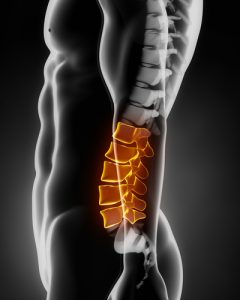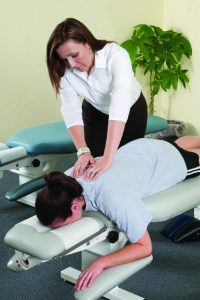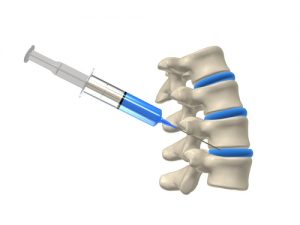How Common is Degenerative Disc Disease?
Chronic low back pain due to degenerative disc disease is very common. The intervertebral disc is estimated to be the cause of low back pain approximately 40% of the time.
Approximately 30% of people between the ages of 30 to 50 have evidence of degenerative disease on MRI. But only very few of those individuals will have pain from the degeneration.

The most common treatments that exist right now for degenerative disc disease involve reactive types of treatments rather than an effective method of repairing and fixing the problem.
How Does Disc Degeneration Occur?
As a disc degenerates, the disc begins to lose a lot of its fluid. As a normal baseline, the intervertebral disc contains 80% water and 20% proteins and substances.
Over time, the discs have a tendency to lose water. There is a genetic component to disc degeneration, which explains why some individuals who have no history of trauma are afflicted with severe pain from degeneration.
What Part of the Disc is Painful?
The disc is made up of two areas with the outer part being called the annulus fibrosis and the inner part called the nucleus pulposus. The outside part of the disc has nerve endings and may lead to significant pain if it has tears in it from degeneration. The inner part, the nucleus, does not have any nerve endings in it so therefore is not subjected to pain even if it is significantly degenerated.
The inner part, the nucleus, does not have any nerve endings in it so therefore is not subjected to pain even if it is significantly degenerated.
As degeneration of the disc occurs, tears may be seen in the outer part of the disk leading to pain. This is the only part of the disc that really has any sort of blood supply, and therefore it may have a slight amount of repair capability.
What Symptoms are Seen With Degenerative Disc Disease?
If a person is symptomatic from a degenerative disc, the pain is often continuous in the low back, waxing and waning over time. The pain is usually situated in the lower back, and may also radiate into the buttocks and hips or legs.
The disc degeneration may be severe enough to where adjacent nerve roots may get pinched, causing sciatica type symptoms with radiating leg pain. Pain is often worse when sitting, as that is when the pressure on the disc is the worst. Movements such as bending and twisting may exacerbate a person’s pain.
Call (602) 507 – 6550 to schedule your Appointment TODAY!

What Treatments are Available for Pain Due to Degenerative Disc Disease (DDD)?
When an individual has low back pain from degenerative disc disease, there are multiple nonoperative treatments that can help keep the pain from needing a surgical procedure.
Medications that have been shown to be helpful for DDD include NSAID’s and Tylenol for mild to moderate pain. These should always be taken according to manufacturer’s recommendations. Narcotics may be helpful for acute pain with DDD pain flare-ups, but using them long term is not a good idea as there are risks of addiction and tolerance.
tolerance.
Physical rehabilitation (PT) may help dramatically by strengthening the muscles around the spine along with the abdominal muscles. This is called core stabilization and relieves pressure off the degenerative disc and lessens pain. Along with the active PT regimen, heat, icing, electrical stimulation, and ultrasound may provide excellent pain relief as well.
Chiropractic manipulations can relieve disc degeneration pain by increasing blood flow to the region and decompressing nerves that are being pinched. Spinal adjustments also release endorphins, providing pain relief.
Spinal decompression therapy has been shown to provide substantial benefits for those suffering from a degenerative disc or multiple levels. In fact, studies have shown that over 80% of those suffering from a disrupted disk can achieve relief for over six months.
Are There Injection Treatments that Work Well?
Steroid injections can provide temporary pain relief, and a 2004 study in Spine showed satisfactory short term results with their use. A larger study was reported in 2011 Spine Journal which showed the same short term benefits. There is considerable debate in the pain management community about their use in the disc.
There are some studies going on looking at disc regeneration with biologic substances, including the stem cell injection study at Arizona Pain Specialists.
Stem cells have the capability to regenerate cells and protein in the intervertebral disc and restore its function while decreasing pain. But research needs to be accomplished in order to prove that. To be considered for inclusion in the Arizona Pain Specialists’ stem cell injection study, call 602-507-6550 today.

The treatment known as Intradiscal Electrothermal Treatment, IDET, is still utilized at some pain clinics but has fallen out of favor at most. One reason is that although the procedure has a fairly low risk profile, it did not show overwhelmingly effective results in numerous research studies (2009 Pain Physician). A significant amount of insurance companies therefore no longer reimburse for the procedure, although some pain clinics will perform the procedure as a fee for service.
For those who have significant chronic low back pain, effective treatment is typically a combination of efforts. This may include medication management either with narcotic medication or anti-inflammatories along with PT, chiropractic, and injections. Research has shown that the most effective nonoperative treatment for DDD actually involves low impact aerobic activity such as swimming or cycling.
How Often do People With Degenerative Disc Disease Need Surgery?
Overall, individuals with degenerative disc disease who undergo conservative treatment are able to achieve a baseline pain that is tolerable and avoid surgery over 75% of the time.
The pain doctors at Arizona Pain Specialists incorporate comprehensive pain management for degenerative disc disease including options of medication management, interventional procedures, physical rehabilitation and chiropractic treatment along with spinal decompression therapy.
One of the most exciting treatment options available now is the stem cell injection clinical trial for chronic low back pain due to degenerative disc disease.
If you have chronic low back pain, Arizona Pain Specialists can help and provides all of the above options with an Award Winning, Board Certified team of pain management doctors and chiropractors.
Call (602) 507 – 6550 to schedule your Appointment TODAY!

![]()



 The inner part, the nucleus, does not have any nerve endings in it so therefore is not subjected to pain even if it is significantly degenerated.
The inner part, the nucleus, does not have any nerve endings in it so therefore is not subjected to pain even if it is significantly degenerated. tolerance.
tolerance.